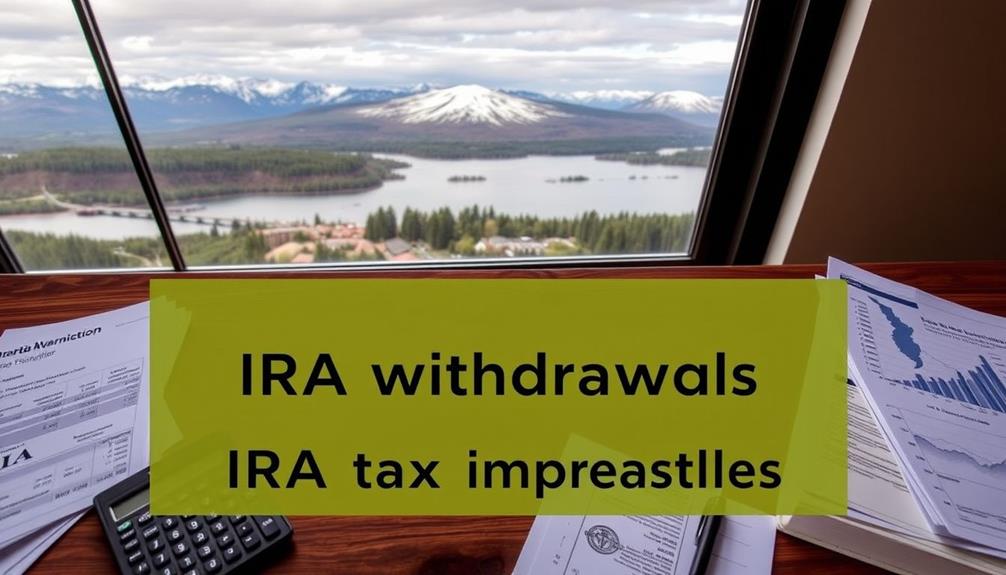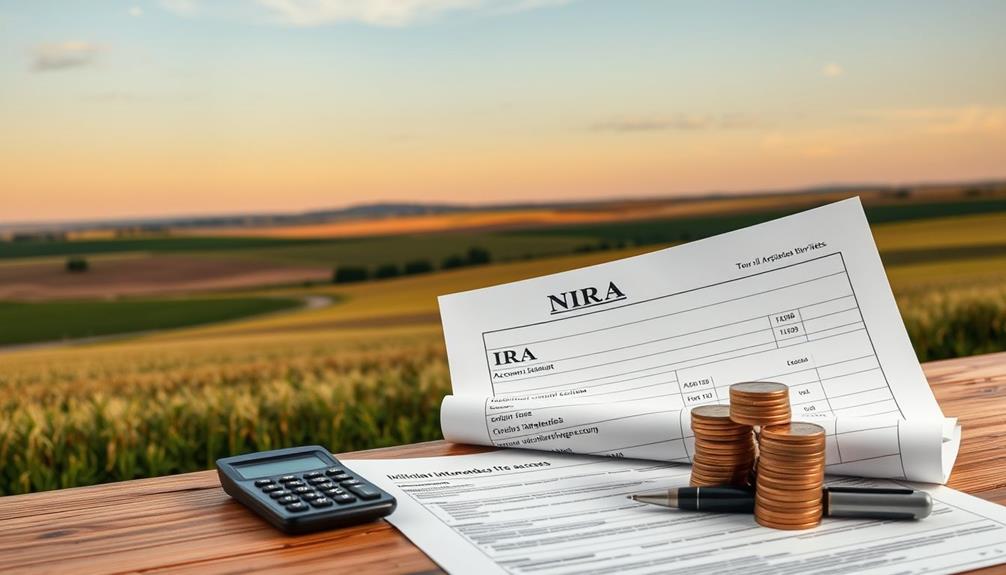In Washington, you do not have to worry about state taxes on your IRA withdrawals as the state does not levy a personal income tax. This allows you to retain a larger portion of your retirement savings. While property and sales taxes are still applicable, they do not impact your IRA distributions. It is important to note that federal taxes will still apply depending on the type of IRA you possess. Strategically planning your withdrawals can assist in reducing federal taxation. Would you like to discover the optimal strategies for maximizing your retirement income? There is a plethora of valuable information accessible to assist you in understanding this subject.
Key Takeaways
- Washington has no personal income tax, allowing residents to withdraw IRA funds without state tax implications.
- Property tax in Washington averages around 0.98%, with potential exemptions for seniors based on income and age.
- A 7% capital gains tax applies to profits over $262,000, but it does not affect IRA withdrawals.
- All retirement income, including IRA distributions, is exempt from state taxation, benefiting seniors financially.
- Utilize resources like AARP's Tax-Aide and IRS VITA for free tax assistance in navigating IRA withdrawals and implications.
Understanding Washington State Taxes

When it comes to understanding Washington State taxes, you'll find that the lack of a personal income tax is a significant advantage for residents. This means that when you make IRA withdrawals, you won't have to worry about state income tax eating into your retirement savings. Instead, your focus can remain on how to make the most of your funds.
Additionally, it's advantageous to have a strong grasp of your common financial terms to navigate your retirement planning effectively. However, it's important to be aware of other taxes that do apply. For instance, Washington has an average property tax rate of about 0.98% of assessed market value, which can affect your overall cost of living but doesn't directly impact your IRA withdrawals.
Additionally, while the state introduced a 7% capital gains tax on profits exceeding $262,000 in 2022, this tax doesn't apply to IRA withdrawals. If you're a resident, make sure you live in Washington for over 183 days in a tax year, as this will affect your liability for the capital gains tax.
Federal Tax Implications for IRA Withdrawals

When you withdraw from your IRA, it's vital to understand how it'll impact your taxable income and what strategies you can use for timing your withdrawals.
If you take money out early, you might face penalties, so planning ahead is key.
Additionally, considering options like a 401k to Gold IRA rollover can provide tax advantages and potential long-term benefits.
Let's explore these federal tax implications together.
Taxable Income Considerations
IRA withdrawals can greatly impact your taxable income, especially when examining federal tax implications. In Washington State, since there's no state income tax, you won't have to pay state taxes on your IRA withdrawals.
However, traditional IRA withdrawals are subject to federal tax because these contributions were made with pre-tax dollars. This means the amount you withdraw is treated as ordinary income. It's important to evaluate your investment options and how they can affect your retirement planning, such as by exploring precious metal investment options that may provide additional diversification.
Your federal tax rate on these withdrawals will depend on your total taxable income for the year and the applicable federal tax brackets. If you withdraw a large amount, be cautious, as it might push you into a higher tax bracket, increasing your overall federal tax liability.
On the other hand, if you've got a Roth IRA, you can breathe easier. Withdrawals from a Roth IRA are tax-free at the federal level, provided the account has been open for at least five years and you're at least 59½ years old.
Planning your withdrawals carefully can help you manage your retirement income taxable, ensuring you keep as much of your hard-earned savings as possible.
Withdrawal Timing Strategies
Timing your withdrawals can greatly influence your federal tax liability and overall retirement strategy. When you withdraw funds from a traditional IRA, the amount you take is added to your taxable income for that year, which can push you into a higher tax bracket. By strategically planning your withdrawal timing, you can manage your taxable income and potentially stay in a lower tax bracket during retirement.
Consider delaying your IRA withdrawals until you reach age 72 to avoid Required Minimum Distributions (RMDs), which are taxed as ordinary income. This gives you more control over your retirement distributions and helps you minimize your federal income tax burden.
Additionally, aligning your withdrawals with years of lower income or maximizing deductions and credits can further reduce your overall tax liability.
Keep in mind that if you withdraw from your traditional IRA before age 59½, you may face a 10% early withdrawal penalty in addition to regular income tax, unless exceptions apply.
Penalties for Early Withdrawals
Facing penalties for early withdrawals can greatly impact your retirement savings. If you take money out of a traditional IRA before you turn 59½, you'll face a 10% federal penalty on top of ordinary income taxes. This means that not only will you pay federal taxes on your withdrawals from retirement accounts, but you'll also lose a chunk of your savings to penalties.
In Washington State, while there's no state income tax to worry about, federal penalties still apply.
Roth IRAs offer a bit more flexibility; you can withdraw your contributions tax-free and penalty-free anytime. However, if you withdraw earnings before 59½, you might face those pesky penalties unless you meet certain conditions, like being disabled or incurring specific medical expenses.
It's essential to remember that if you do take early withdrawals, you must report the total amount to the IRS on Form 1040 and include the penalty on Schedule 2. This can affect your overall tax situation, even influencing your Social Security benefits in the long run.
Planning ahead can help you avoid unnecessary penalties and protect your retirement savings.
Retirement Income and IRA Withdrawals

Steering retirement income can feel overwhelming, especially when weighing the implications of withdrawals from your Individual Retirement Account (IRA).
In Washington State, you're in a favorable position since IRA withdrawals aren't subject to state income taxes. This means you can keep the full amount of your distributions, a significant advantage over states that do tax IRA withdrawals.
However, you still need to be aware of federal income tax rates that apply to your IRA distributions. The timing of your withdrawals can impact your federal tax bracket and overall tax liability, so careful planning is essential.
It's wise to evaluate how your IRA withdrawals will fit into your overall tax retirement income strategy, especially if you're also receiving Social Security benefits, which can further influence your taxable income.
As you navigate these financial waters, keep an eye on potential changes to tax laws that might affect your retirement savings.
Understanding both federal tax implications and the benefits of Washington's lack of state income tax can help you make informed decisions about your retirement income strategy.
Sales and Property Tax Considerations

When planning for retirement in Washington State, understanding sales and property tax considerations is essential. One of the biggest advantages for retirees is that Washington has no personal income tax, meaning your IRA withdrawals won't be taxed at the state level. You can keep the full amount of your distributions, giving you more flexibility in managing your finances.
However, it's important to keep an eye on property tax and sales tax. The average property tax rate is about 0.94%, but this can vary considerably, especially in high-value areas like King County. To alleviate some of these costs, you might want to explore property tax exemption programs available for seniors, which can reduce your financial obligations.
On the sales tax front, Washington's combined rate averages around 9.38%. While this impacts your overall cost of living, certain exemptions—like those for prescription drugs and most groceries—offer some tax relief.
Understanding these aspects can help you budget more effectively, ensuring you make the most of your retirement funds without being caught off guard by state taxes.
Tax Benefits for Seniors in Washington

Although many states impose taxes on retirement income, Washington stands out as a haven for seniors thanks to its lack of a personal income tax. This means you can withdraw from your IRAs without facing additional state taxes, allowing your retirement funds to stretch further.
All forms of retirement income, including IRA distributions, are exempt from state taxation, which enhances your financial benefits as a retiree. While you may still encounter federal income tax on your IRA withdrawals, the absence of state-level taxation in Washington means you get to keep more of your money.
This advantage allows you to maintain a higher disposable income, making it easier to cover your living expenses. In addition to the lack of state income taxes, Washington offers property tax exemptions or deferrals based on your income and age.
These benefits further support your financial stability, especially if you're relying on Social Security retirement benefits alongside your retirement savings. Overall, Washington's tax structure makes it an attractive state for seniors looking to maximize their retirement income while minimizing their tax burdens.
Planning Your Withdrawals Effectively

When planning your IRA withdrawals, take advantage of Washington's lack of state income tax to maximize your tax-free benefits.
Timing your distributions strategically can help you stay within lower federal tax brackets, boosting your financial stability.
Tax-Free Withdrawal Benefits
Maximizing your IRA withdrawals in Washington State can provide significant tax-free benefits, allowing you to enjoy your retirement income without the burden of state taxes. Since Washington doesn't impose a state income tax, you can keep the full amount of your IRA withdrawals, boosting your disposable income. This means you can fund your lifestyle, pay for unexpected expenses, or even explore part-time work without worrying about additional state taxes on your earnings.
While your withdrawals are tax-free at the state level, you still need to take into account federal income tax implications. It's crucial to understand your federal tax bracket so you can plan your distributions effectively.
By managing your IRA withdrawals, you can stay within favorable federal tax brackets, minimizing your overall tax liability. This strategic planning allows you to maximize your retirement income while maintaining a healthy financial lifestyle.
You can enjoy your golden years with peace of mind, knowing that your IRA withdrawals won't be diminished by state income taxes, thereby enhancing your financial freedom in retirement.
Strategic Timing Considerations
Timing your IRA withdrawals wisely can greatly impact your overall tax efficiency and retirement income. In Washington State, you benefit from the absence of state income tax on these withdrawals, allowing you to keep more of your hard-earned money.
To maximize this advantage, consider the federal tax implications of your withdrawals. By strategically timing your distributions, especially during years when your income is lower, you may fall into lower tax brackets, thereby reducing your overall tax liability.
Retirees should think about withdrawing funds during specific periods, such as after turning 65 or in years with diminished income from other sources. This approach not only minimizes the federal tax impact but also helps maintain a stable cash flow.
Planning your IRA withdrawals around your other income can guarantee you remain in a favorable tax situation while meeting your financial needs.
Ultimately, the key is to assess your financial landscape regularly and adjust your withdrawal strategy as needed. By doing so, you'll optimize your tax efficiency and enhance your retirement income, making the most of your IRA without the extra burden of state income tax.
Maximizing Financial Stability
Effective withdrawal planning not only boosts your financial stability but also helps you navigate the complexities of retirement income. In Washington State, you benefit from the absence of a personal income tax, which means you can withdraw funds from your IRAs without facing state tax implications.
This advantage allows you to maximize your disposable income, making it easier to manage other expenses, like property taxes, which average 0.98% in the state.
When planning your IRA withdrawals, consider the timing and amount to minimize your federal income tax liabilities. If you anticipate having lower taxable income in certain years, it might be wise to withdraw funds then.
Additionally, exploring tax-efficient strategies, such as converting traditional IRAs to Roth IRAs, can yield long-term financial benefits.
Don't forget the role of Social Security in your overall retirement income. Since Washington State doesn't tax Social Security benefits, you can boost your financial stability by integrating these payments into your withdrawal strategy.
Resources for Tax Assistance in Washington

For residents maneuvering the complexities of IRA withdrawals in Washington, several valuable resources are available to help with tax assistance.
AARP offers free tax support through its Tax-Aide program, specifically designed to help older adults navigate their tax obligations, including those related to IRA withdrawals.
If you're low-income, the IRS Volunteer Income Tax Assistance (VITA) program provides additional support, ensuring you understand how to handle the tax implications of your withdrawals.
Local community centers across Washington frequently host tax preparation events, especially during tax season, where you can gain insights and assistance tailored to retirees managing IRA withdrawals.
These events often connect you with knowledgeable volunteers who can clarify any questions you may have about state taxes.
Additionally, you can leverage online tools and resources to grasp your tax obligations related to IRA withdrawals.
The Washington State Department of Revenue is an essential resource, offering extensive information on state tax laws and exemptions that affect your withdrawals.
Frequently Asked Questions
Are IRA Withdrawals Taxable in Washington State?
In Washington State, IRA withdrawals aren't taxed at the state level. You won't owe state income tax on those withdrawals, but remember, federal taxes might still apply depending on your specific financial situation.
Do You Pay State Income Tax on IRA Withdrawals?
Isn't it ironic how you don't pay state income tax on IRA withdrawals? In Washington, you can enjoy your retirement funds without those pesky state taxes, freeing up more cash for your golden years.
Is Retirement Income Taxed in Washington State?
In Washington State, retirement income isn't taxed. You won't pay state income tax on your IRA withdrawals, allowing you to keep more of your hard-earned savings. Just remember, federal taxes still apply.
What States Require Tax Withholding on IRA Distributions?
Ever wondered which states take a bite out of your IRA withdrawals? States like California and New York require tax withholding on distributions. Always check local laws, since federal taxes still apply regardless of state rules.
Conclusion
In the grand circus of retirement, maneuvering Washington's tax landscape can feel like juggling flaming torches while riding a unicycle. You've got the federal ringmaster demanding his cut, and the state quietly waiting in the wings. But fear not! With a little planning and savvy, you can turn those IRA withdrawals into a smooth performance instead of a slapstick routine. So, grab your tax clown nose, and let's make those withdrawals as painless as possible!









